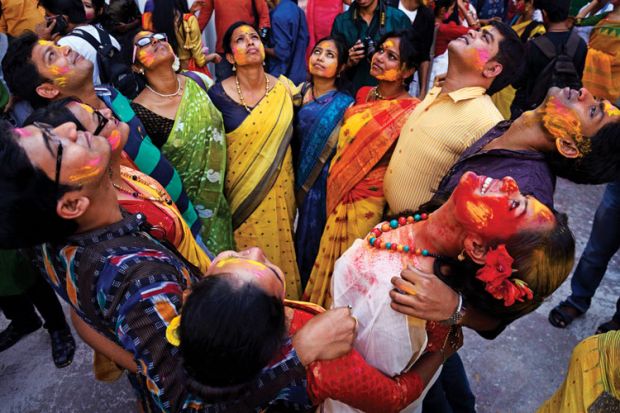View the full results of the BRICS & Emerging Economies Rankings 2016
Do emerging economies need “world-class” universities? Should countries such as India try to compete with the likes of Harvard University and the University of Oxford in global league tables, or should they try to build very different institutions to meet their own challenges?
These were the questions that dominated three days of debate and discussion in Delhi at the Times Higher Education BRICS and Emerging Economies Universities Summit last week.
In one exchange, Shiv Visvanathan, vice-dean of the Jindal School of Government and Public Policy at the O.P. Jindal Global University in Delhi, attacked the idea that Indian universities should attempt to play the “rankings game”.
“To say that rankings is excellence is like saying IQ is intelligence,” he told delegates. “We’re sounding like second-hand imitations of Harvard and Oxford.”
“We need alternative paradigms, we need alternate styles of thinking; none of this is mentioned in the rankings,” he continued.
He insisted that he was not advocating a “closure” of India to outside ideas. “Rather than imitating the West…let’s out-think the West. We have been mimic-men for too long,” he said, adding that new approaches were needed particularly in medicine, economics and ecology.
But his criticisms were rebuffed by Nikhil Sinha, vice-chancellor of Shiv Nadar University in Uttar Pradesh, who was more positive about judgement by rankings. “I want to see what the rest of the world is doing,” he said.
Universities in India may decide not to follow the same direction as top-ranked Western institutions, he said, “but until I open myself up to it, I won’t understand what it is I’m trying to accept or reject”.
He also hoped that India could “get beyond this discourse of ‘us and the West’. We surely cannot structure all our thinking as ‘us’ versus ‘them’, and [have] our entire intellectual horizon be an outcome of the colonial experience.”
Nowadays, scientific papers had authors from “all over the world” and scientific progress was an “international enterprise”, he argued.
The conference saw the launch of the THE BRICS and Emerging Economies Rankings 2016. China was the best represented country, with 39 institutions in the top 200. India managed 16 universities, although none in the top 10.
In the wider global rankings, although universities from some countries outside the most developed world have managed to improve their positions in the past decade, the upper echelons are still dominated by North American and European institutions.
At a dinner prior to the conference, Pranab Mukherjee, India’s president, said that the country could not aspire to be a world power without having a single “world-class” university.
At the opening of the conference on 2 December, delegates heard from Stephen Marks, Francois-Xavier Bagnoud professor of health and human rights at Harvard, who argued that there was an “ambiguity” about using top Western universities as a model for emerging economies.
Noting high tuition fees in the US, he quoted an Economist analysis from earlier this year that argued that “the problem [with such universities] lies in getting value for money on the teaching side”.
But Raj Kumar, vice-chancellor of O.P. Jindal Global University, made the point that emerging economies need to support “world-class” universities as part of the “democratisation” of higher education. Such influential institutions should no longer be the “prerogative” of a handful of wealthy Western countries, he said.
后记
Print headline: World-class campuses ‘may not be best’ for BRICS nations




